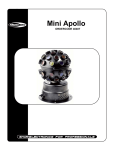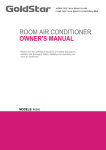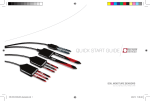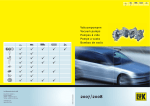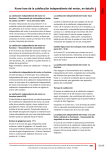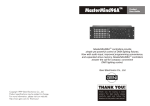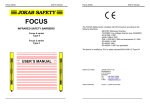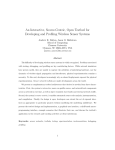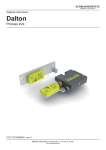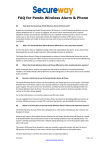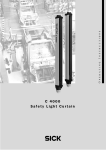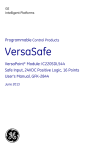Download ABB Tina 7A Technical data
Transcript
5 5/1 2TLC172001C0202 | ABB Safety Handbook Safety system - Vital Supervision of dynamic safety signals Safety system - Dynamic safety circuit - Vital-Tina 5/3 Safety Controller - Vital Why should you use the Vital safety system? 5/5 How does a dynamic circuit of Vital work? 5/6 Safety Controller - Vital 5/7 Adaptation unit - Tina Why should you use the Tina adaptation units? 5/21 Tina is available in several versions 5/22 Tina 1A 5/23 Tina 2A/B 5/24 Tina 3A/APS 5/25 Tina 4A 5/26 Tina 5A 5/27 Tina 6A 5/29 Tina 7A 5/30 Tina 8A 5/31 Tina 10A/B/C 5/33 Tina 11A 5/35 Tina 12A 5/36 Accessories5/37 Example of safety sensors connections based on ’Y’ branch 5/38 Connection examples 5/40 ABB Safety Handbook | 2TLC172001C0202 5/2 5 Safety system Dynamic safety circuit – Vital and Tina Vital is a safety controller with a dynamic safety circuit that can monitor up to 30 sensors, such as Eden, in accordance with the highest safety level. Vital has selectable manual or automatic resetting and dual outputs. (The Pluto safety PLC has many inputs for dynamic safety circuits.) Each active sensor and Tina unit has LEDs that indicate OK (green), broken safety circuit (red) or flashing if the loop has been broken by another earlier sensor. Active safety sensors for dynamic safety circuits 5 Vital Safety circuit category up to PL e according to EN ISO 13849-1 Patented solution Tina units that convert static/OSSD to dynamic signals Dynamic safety Dynamic safety signal that tests a sensor 200 times per second. 0V 24V 5/3 2TLC172001C0202 | ABB Safety Handbook Sensors with static or OSSD outputs that are connected via Tina units Vital is available in three versions Vital 1 –– Up to 30 sensors can be connected to the same dynamic safety circuit Dynamic circuit 1 Dynamic circuit 1 Vital 2 –– Two safety circuits are monitored by one module –– Simple system with extensive functionality –– Up to 10 sensors can be connected to each dynamic safety circuit –– Output group 2 can be set for time delay –– Three different modes of operation Dynamic circuit 2 5 Contact circuit 1 Vital 3 –– Two safety circuits are monitored by one module –– Devices with two-channel, opening contacts can be connected to one circuit –– Simple system with extensive functionality –– Output group 2 can be set for time delay –– Three different modes of operation Dynamic circuit 2 One Vital supervises the entire robot cell! This example shows aSmile cell consists dynamic 11EAthat Tina Eden Focus of Reset Eden Smileprotection 11EA Tina Eden FMI sensors connected to a Vital with the following functions: Transmitter Receiver Focus Reset Smile 11EA Tina FMI Transmitter Receiver Two charging stations 1A At each charging station a light curtain checks forTinaanyone 2 2 putting their hand into a risk area, 2and an Eden sensor checks2 3 3 Smile 11EA Tina Eden Focus Reset 3 3 whether a robot is inside the same 1 M12-3B 1risk 1 area. This means that M12-3B 1 FMI Tina 10B Tina 10B a stop is only ordered if a robot and a person are in the same 2 3 2 3 area. When the station is clear, the person presses the reset M12-3M Transmitter Receiver M12-3M button connected to the light curtain. 1 1 Eden Smile 11EA Tina Eden Focus Transmitter Receiver A B Tina 1A 2 Tina 8A Fence with Eden-interlocked door If the door is opened, the robot stops. To reset the robot sysVital button tem, the door must be closedPlutoand a supervisory reset operated. 2 2 3 M12-3B 1 2 1 3 M12-3B 1 1 3 Tina 10B 3 2 3 M12-3M M12-3M 1 Three emergency stops with Tina units If any of the emergency stop buttons is pressed, the robot performs an immediate emergency stop. 3 Tina 10B 2 Reset Smile 11EA Tina FMI 1 Tina 8A Pluto Vital ABB Safety Handbook | 2TLC172001C0202 5/4 Why should you use the Vital safety system? 5 — to be able to connect several safety components in series (up to PL e, cat. 4) and supervise them with only one safety controller! Vital is the heart of a solution which makes it possible to install/connect many different types of safety device in the same safety circuit and still achieve PL e according to EN ISO 13849-1. The Vital module is based upon a dynamic single-channel concept as opposed to conventional dual-channel safety relays. Up to 30 dynamic sensors can be connected directly in the safety circuit and be supervised by only one Vital module.The Vital therefore replaces several safety relays. Safety components with output contacts can be connected to the Vital via low cost Tina adaptors. The Vital also has automatically or manually supervised reset selection, dual safety outputs, and an information output for reset indication and status information for PLC´s. Reasons to choose Vital – – PL e, according to EN ISO 13849-1 dynamic safety circuit –– C an accommodate long cable lengths –– Manually supervised or automatic reset –– Two NO safety outputs –– D etachable connector blocks –– LED indication of: power supply, dynamic signal and outputs –– Information output with two functions –– C ost-effective cable routing/connections 5/5 2TLC172001C0202 | ABB Safety Handbook — to supervise safety components! Most safety components on the market can be connected to the Vital module. Dynamic sensors enable safety PL e to be achieved in a single-channel system. For example ABB Jokab Safety´s dynamic non-contact Eden sensor, Spot light beam and emergency stops (via Tina adaptors) can be used. Even mechanical switches can be connected to Vital with the aid of ABB Jokab Safety´s Tina adaptors. — for easy installation and assembly of a safety system! Vital is a small electronic safety controller that dynamically supervises a number of safety components. Vital´s detachable connector blocks simplify the connection, trouble-shooting and exchange of modules. The Vital and other safety components can be connected together using standard cables and with cables having M12 connections. How does a dynamic circuit of Vital work? The Eden sensor monitors that doors are closed Emergency stop INCA Tina To stop the machine in case of danger 5 Smile Tina emergency stop to stop machinery when there is a hazard Light Curtain Focus Prevents passage with integrated muting function The dynamic signal consists of a square wave that is transmitted through the safety circuit. The signal is inverted at each safety component and is monitored 200 times per second by Vital or Pluto. The dynamic signal is transmitted as single channel throughout all the protection in the same safety circuit between input terminals T1 and R1. If a protection breaks, the dynamic signal is not transmitted which is detected by Vital which breaks its safe outputs. Even short circuits across a protection are detected when the signal is inverted in each sensor (the Safety module Vital monitors the safety sensors in series according to PL e EN ISO 13849-1. protection is then OK), while Vital expects a correctly inverted signal at the right time. In this case, an even number of sensors are connected to the safety loop which means that the dynamic signal will be inverted an even number of times when it is evaluated by Vital. This is determined by the terminal inputs S1 and B1 being connected together. If an odd number of sensors have been connected, connection of S1 is not required. As the signal is evaluated by Vital at each pulse, i.e. more than 200 times per second, faults and short circuits are detected within a few milliseconds. ABB Safety Handbook | 2TLC172001C0202 5/6 Safety controller Vital Approvals: TÜV Nord – Vital 1 TÜV Rheinland – Vital 2 and 3 Application: –– Entire safety system based on the dynamic safety circuit. Features: –– –– –– –– 5 –– –– –– –– Vital is based on a single channel safety concept where multiple safety sensors can be connected in series and monitored with a single safety controller. A dynamic signal is sent from Vital through all connected sensors, and then returned to Vital which then evaluates the received signal. As each safety sensor inverts the signal, it is possible to detect short circuits or faults in any of the sensors. Vital is designed for use with ABB Jokab Safety Eden sensors, Tina components and Spot light grids or similar products. Vital 2 and 3 are both safety controllers with two safe input functions and two output groups, the only difference between the two models being in the input configuration. 5/7 2TLC172001C0202 | ABB Safety Handbook Easy installation Flexible Cost effective Display for troubleshooting (Vital 2 and 3) A wide range of safety sensors can be connected into the circuit Several safe outputs Information output Outputs with time delay (Vital 2 and 3) Vital 1 Safety controller –– Up to 30 sensors can be connected to the same dynamic safety circuit Dynamic circuit 1 Vital 2 Safety controller Dynamic circuit 1 Dynamic circuit 2 5 –– Two safety circuits are monitored by one module –– Simple system with extensive functionality –– Up to 10 sensors can be connected to each dynamic safety circuit –– Output group 2 can be set for time delay –– Three different modes of operation Vital 3 Safety controller Contact circuit 1 Dynamic circuit 2 –– Two safety circuits are monitored by one module –– Devices with two-channel, opening contacts can be connected to one circuit –– Simple system with extensive functionality –– Output group 2 can be set for time delay –– Three different modes of operation ABB Safety Handbook | 2TLC172001C0202 5/8 Reset connections – Vital 1 Manually supervised reset Automatic reset Testing external contactor status B1 The manually supervised reset contact connected to input X1 must be closed and opened in order to activate the relay outputs. Automatic reset is selected when B1, X1 and X4 are connected. The relay outputs are then activated at the same time as the inputs. 5 Contactors, relays and valves can be supervised by connecting ‘test’ contacts between B1 and X1. Both manually supervised and automatic reset can be used. Output connections – Vital 1 Relay outputs Information outputs +24V B1 +24V B1 0V B2 Y14 0V B2 Y14 Vital 1 Vital 1 0V 0V 0V The Vital 1 has two (2 NO) safety outputs. In order to protect the output contacts it is recommended that loads (inductive) are suppressed by fitting correctly chosen VDR’s, diodes etc. Diodes are the best arc suppressors, but will increase the switch-off time of the load. Connection of S1 Even number of units in series (Eden+Spot+Tina) requires a connection between B1 and S1. S1 is not connected at odd number of units. See drawing below figure A and other examples in the book 5/9 2TLC172001C0202 | ABB Safety Handbook Vital 1 has a switching relay output for information. The function is determined by a DIP switch. The DIP switch position 1 (original position) is the information output Y14 internally connected to 0V and +24 V as per: – – Y14 is closed to 0V (B2) internally when Vital 1 has not been reset. – – Y 14 is closed to +24 V (B1) when Vital 1 has been reset. In DIP switch position 2 (the purpose of the function is to start/restart block, RES) the information output Y14 is internally connected to 0V and +24 V as per: –– Y 14 is internally closed to 0V (B2) when the dynamic safety loop is open or when the dynamic safety loop is closed and Vital 1 has been reset. – – Y14 is internally closed to +24 V (B1) when the dynamic safety loop is closed but Vital 1 has not been reset (RES). Technical data – Vital 1 Article number Vital 1 2TLA020052R0000 Level of safety Relay information output (changeover contact) Y14–(0V) Indicates Vital is not reset +(24V) Indicates Vital is reset EN ISO 13849-1 PL e/Cat. 4 EN 62061 SIL 3 IEC/EN 61508-1…7 SIL 3 LED indication PFHD 2.74×10 -8 On Colour Grey Flashing light: under-voltage or Weight 220 g overload. T Power supply Vital, A1-A2 Max. load on Y14 24 VDC ±15% 200 mA (Internal automatic fuse) Fixed light: supply voltage OK, T: Signal out OK. R: Signal in OK. R 1 Indicates that the output relays 2 have been activated From Vital to sensors/units, B1-B2 24 VDC Mounting Fuse An external fuse should be fitted in the supply to A1 3 AT 150 Ohm 1 Nm Max screw torque Solid conductors 1x4 mm2 / 2x1,5 mm2 / 12AWG 3W Conductor with socket contact 1x2,5 mm2 / 2x1 mm2 Air and creep distance 4kV/2 DIN VDE 0110 48 W Protection class DC supply, nominal voltage (witDC supply, nominal voltage (with max load) -10°C to + 55°C Max connection area: Power consumption hout load) 35 mm DIN rail Operating temperature range Connection blocks (detachable) Max line resistance at nominal voltage to X1 DIN rail Dynamic safety circuit Enclosure IP40 IEC 60529 T1 Output signal Connection blocks IP20 IEC 60529 R1 Input signal Conformity EN ISO 12100-1, -2, EN 954-1, EN Reset input X1 ISO 13849-1, EN 62061, EN 60204-1, Supply for reset input +24 VDC IEC 60664-1, EN 61000-6-2, Reset current 30 mA max. (inrush current 300 mA EN 61000-6-4 EN 60947-5-1, during contact closure) EN 1088, EN 61496-1, Minimum contact closure time for reset IEC/EN 61508-1…7 150 ms Connection of S1 Even numbers of sensors (Eden + Spot T/R + Tina) require a connection between B1 and S1. S1 is not connected for odd numbers of sensors. Odd number, no connection between B1 and S1. Number of sensors Max. number of Eden/Tina to Vital 1 30 Total max. cable length to Eden/ Tina 1000 m Max. number of Spot T/R to Vital Up to 6 pairs Total max. cable length to Spot T/R 600 m Maximum number of units varies depending on the installation and cable size. For more information, see the examples in this chapter. Response time At Power on < 65 ms When activating (input-output) < 40 ms When deactivating (input-output) < 48 ms At Power loss < 55 ms Connector blocks are detachable (without cables having to be disconnected) Relay outputs NO 2 Max switching capacity, resistive load 6A/250 VAC/1500 VA/150W Minimum load 10 mA/10V Contact material AgCdO Mechanical life >107 operations External fuse (EN 60947-5-1) 6.3A or 4A slow ABB Safety Handbook | 2TLC172001C0202 5/10 5 Connection examples of safety devices to Vital 1 5 Connection of units and cable lengths to Vital 1 5/11 2TLC172001C0202 | ABB Safety Handbook Three connection alternatives According to PL e (EN ISO 13849-1), connection of sensors/ adaptor units in the Vital safety circuit must be made as the connection examples. Example Use separate connection cables from each sensor/adaptor unit to the Vital safety controller. Interconnections to be made via suitable terminals in the control cabinet. Example Use Tina4A/Tina8A connector blocks to simplify the connection of externally mounted sensors/adaptor units. Only Tina4A/ Tina8A connector blocks may be used. Use of any other connector blocks will not meet the safety circuit requirements. Example Use M12-3A and M12-3B ’Y’ connectors to connect sensors in series/parallel. Cable lengths and number of sensor/adaptor units for the three connection examples. In order to determine the number of sensor/adaptor units that can be connected to a Vital 1 unit it must be remembered that 1 (one) Spot T/R is equivalent to 5 (five) Eden or Tina units. Units in parallel are equal to one unit. The following examples provide guidance as to possible configurations and cable lengths using suitable cables. Example Up to 1000 metres (0.75 mm2 or 0.34 mm2 conductors) in total can be connected to the sensors/units in this example. The connection is equivalent to 9 Eden or Tina units. A maximum of 30 Eden or Tina units can be connected to the Vital 1 unit on a maximum cable length of 500 metres (0.75 mm2 conductors) or 300 metres (0.34 mm2 conductors). Example Up to 600 metres (0.75 mm2 conductors) to Tina 8A and 10 metre cables type M12-C1012 (0.34 mm 2) to each sensor/ unit connected to the Tina 8A. This connection example is equivalent to 17 Eden or Tina units. A maximum of 3 Tina 8A units, equivalent to 27 Eden/Tina units (= 3 x 8 connected to Tina 8A + 3 Tina 8A) can be connected to one Vital 1 with a total cable length of 600 metres (0.75 mm 2). Up to 6 Tina 4A units can be connected to one Vital 1 (equivalent to 30 Eden/Tina units) with a total cable length of 600 metres (0.75 mm 2) to Tina 4A. Example Either 2 x 500 metre cables (0.75 mm2) from the control cabinet and 10 metre cables (0.34 mm2) to each sensor/unit or 2 x 10 metre cables (0.75 mm2) from the control cabinet and 200 metre cables (0.75 mm 2) to each sensor/unit. The connection is equivalent to 16 Eden or Tina units. A Total of 30 Eden/Tina units can be connected using a maximum cable length of 1000 metres (0.75 mm 2) or 400 metres (0.34 mm2). If the power supply is only fed from one direction (from one end of the network) the total cable length is reduced to approx 300 metres (0.75 mm 2) and 100 metres (0.34 mm2). Connection advice for dynamic sensors to Pluto and Vital. Sensors can be connected in many different ways. Here is some advice that can make connection better and more stable. The advice is general, but particularly applicable to the use of Tina 4A and Tina 8A units. –– N ever have more than the recommended number of sensors in the loop. – – If possible use a switched mains power supply that can deliver a stable 24 VDC. – – In the sensor system, use as short cables as possible. –– When connecting a Tina 4A or Tina 8A unit, the supply voltage at the terminal (out at the unit) must not be less than 20 Volts. –– Use screened cable, preferably 0.75 mm 2 or thicker, from the apparatus enclosure and ground it at one end, for example at the apparatus enclosure, not at both ends. – – Do not route the signal wiring close to heavy current cabling or close to equipment that gives off a lot of interference, such as frequency converters for electric motors. – – Never connect “spare” conductors. – – If M12-3B are used for connection of a parallel loop, with supply to the sensors from two directions, the loop must be as short as possible. This is because the conductors that are not being used are also connected, which increases the capacitive load and reduces the stability of the system. ABB Safety Handbook | 2TLC172001C0202 5/12 5 Vital 2 5 Vital 2 is a safety controller that combines functionality with the quick and easy installation of safety sensors. With two safe input functions and two different output groups, Vital 2 offers the capability to exclusively control smaller machine safety systems that would otherwise have required a programmable controller or multiple safety relays. How the two output groups are controlled by the input functions depends on which of the three operating modes is selected (see Selection of operating mode). Input function 1 A dynamic safety circuit where ABB Jokab Safety's safety sensors such as Eden, Tina and Spot can easily be connected in series. Up to 10 Eden or Tina devices can be connected in series per input function. Input function 2 The same function as input function 1. Output group 1 A safe relay output in a duplicated series and a safe transistor output with output voltage of -24 VDC. Output group 2 A safe relay output in a duplicated series and a safe transistor output with output voltage of -24 VDC. In addition, output group 2 contains a non-safe transistor output with output voltage of +24 VDC, intended for information. The output group can have time delay from 0 to 1.5 s. Selection of operating modes Vital 2 can be configured to operate in one of three operating modes M1, M2 or M3. The selection of operating modes is done by connecting one of the terminals M1, M2 or M3 to +24 V. 5/13 2TLC172001C0202 | ABB Safety Handbook Operating mode M1 - Separate function Vital 2 Input function 1 controls output group 1, and input function 2 controls output group 2. 5 Operating mode M2 - Input 1, master function Vital 2 Input function 1 stops all outputs, and input function 2 stops output group 2. Operating mode M3 - Parallel function Vital 2 Input function 1 and input function 2 operate in parallel and control all outputs. Reset/Auto reset 1 resets both input functions (Reset/Auto Reset 2 is not used). ABB Safety Handbook | 2TLC172001C0202 5/14 Connection of protection/sensors - Vital 2 Depending on the input function and the number of sensors connected to the safety circuit (odd or even number), the dynamic signal is connected between different terminals; Input function 1 A dynamic signal is transmitted from T1, and depending on the number of sensors in the safety circuit, the signal connects back to R1 (odd number of sensors) or R2 (even number of sensors). T1 R1 R2 T11 R11 R12 Input function 2 A dynamic signal is transmitted from T11, and depending on the number of sensors in the safety circuit, the signal connects back to R11 (odd number of sensors) or R12 (even number of sensors). Connection of outputs - Vital 2 5 Connection of safe transistor output (-24 V) The safe transistor outputs Q2 (output group 1) and Q12 (output group 2) have an output voltage of -24 V. Connection of safe relay output The safe relay outputs that are duplicated in series break between 1L-Q1 (output group 1) and 11L-Q11 (output group 2). The loads that break should be fitted with spark arresters to protect the outputs. The correct selection of VDR circuit, RC circuit or diode is appropriate. Note that the diode extends the disconnection time of the load. -24 V Q2 Q12 1L 11L Q1 Q11 +24 V Q13 Connection of information output The non-safe transistor output Q13 is high (+24 V) when the outputs from output group 2 are active. The function is therefore dependent on the operating mode selected (see Selection of operating mode). 0V Connection of reset - Vital 2 There are two separate reset functions; Reset 1 and Reset 2. The function of these is dependent on the operating mode selected (see Selection of operating mode). Reset 1 and Reset 2 can be configured for manual or automatic reset independently of each other by means of the input's Auto reset 1 and Auto reset 2. +24 V X1 X11 X4 X14 +24 V X1 X11 X4 X14 Manual monitored reset For manual resetting, a push button must be connected between X1 (Reset 1) or X11 (Reset 2) and +24 V. The monitoring contactors for external devices are to be connected in series with the push button. For manual reset, X4 (for Reset 1) and X14 (for Reset 2) serve as output for resetting the indicator lamps. Automatic reset For automatic reset, X1 and X4 (Auto reset 1) or X11 and X14 (Auto reset 2) must be connected to +24 V. Monitoring contacts for external devices must be connected between +24 V and X1 (Auto reset 1) or X11 (Auto reset 2) . If monitoring contacts are not used, X1 and X11 must be connected to +24 V. Time delay - Vital 2 Output group 2 can have disconnection delay by connecting inputs 0.5s and 1.0s being connected to +24 V. The system is binary, which means that the time values of the inputs are added together to give the total delay time. +24 V 0.5s No delay 5/15 1.0s +24 V 0.5s 0.5 s delay 2TLC172001C0202 | ABB Safety Handbook 1.0s +24 V 0.5s 1.0 s delay 1.0s +24 V 0.5s 1.5 s delay 1.0s Technical data – Vital 2 Article number 2TLA020070R4300 Non-safe transistor output (Q2, Q12) Level of safety 11 – 20 ms EN ISO 13849-1 PL e/Cat. 4 Relay outputs EN 62061 SIL 3 Number of outputs 2 NO IEC/EN 61508-1…7 SIL 3 Max. load capacity, res. load 6A/250 VAC EN 954-1 Cat. 4 Max. load capacity, ind. load AC-12: 2 50 V/1,5 A AC-15: 250 V/1,5 A PFHD Relay output 2.00 × 10 -9 Transistor output 1.50 × 10 -9 Colour Grey Safe transistor outputs Weight 390 g Number of outputs 2 Power supply 24 VDC ±15% Output voltage (rated) –24V Output voltage (at load) > 22V at 800 mA/24V Fuse DC-12: 5 0 V/1,5 A DC-13: 24 V/1,5 A An external fuse must be con- supply voltage nected in series with the supply voltage to A1 23.3V at 150 mA/24V 6A Max line resistance at nominal voltage to X1 150 Ohm Power consumption Total current consumption supply voltage Max. load 300 mA Input function 1 (dynamic safety circuit) 800 mA Short circuit protection Output – 0V Yes Output – +24V Normal (not guaranteed) Non-safe transistor output (information) Dynamic output signal T1 Output voltage (rated) +24 VDC Dynamic input signal R1 (odd number of sensors in a Max. load 1A circuit) Mounting R2 (even number of sensors in a DIN rail 35 mm DIN rail circuit) Operating temperature range -10°C to + 55°C Input function 2 (dynamic safety circuit) Connection blocks (detachable) Dynamic output signal T11 Dynamic input signal R11 (odd number of sensors in a circuit) R12 (even number of sensors in a circuit) Reset input X1/X11 Voltage at X1/X11 when reset +24 VDC Reset current 30 mA (300 mA peak during contact closure) Minimum contact closure time for reset 80 ms Number of sensors 1 Nm Max connection area: Solid conductors 1x4 mm2 / 2x1,5 mm2 / 12AWG Conductor with socket contact 1x2.5 mm2 / 2x1 mm2 Air and creep distance 4kV/2 DIN VDE 0110 Protection class Enclosure IP40 IEC 60529 Connection blocks IP20 IEC 60529 Approved standards EN ISO 13849-1/EN 954-1, EN ISO 13849-2, EN 62061, EN 61496-1, EN 574, EN 692, EN 60204-1, EN 50178, EN 61000-6-2, EN 61000-6-4, EN 61000-4-, IEC/EN 61508-1…7 Max. number of Eden or Tina units per input function Max screw torque 10 Total max. cable length (depending on the number of Eden/Tina units) 500 m Max. number of light beams (Spot T/R) per input function Spot 10 1 Spot 35 3 Total max. cable length (depending on the number of Spot T/R) 100 m Maximum number of units varies depending on the installation andcable size. For more information, see the examples in this chapter. Response time Relay output (Q1, Q11) 15 – 24 ms Safe transistor outputs (Q2, Q12) Connector blocks are detachable (without cables having to be disconnected) 11 – 20 ms ABB Safety Handbook | 2TLC172001C0202 5/16 5 Vital 3 5 Vital 3 is a safety controller that combines functionality with the quick and easy installation of safety sensors. With two safe input functions and two different output groups, Vital 3 offers the capability to exclusively control smaller machine safety systems that would otherwise have required a programmable controller or multiple safety relays. How the two output groups are controlled by the input functions depends on which of the three operating modes is selected (see Selection of operating mode). Input function 1 A two-channel safety circuit designed for opening contacts, e.g. two-channel emergency stop or ABB Jokab Safety's safety switch JSNY5. One channel is fed with the dynamic signal and the other with static +24 VDC. Input function 2 A dynamic safety circuit where ABB Jokab Safety's safety sensors Eden, Tina and Spot can easily be connected in series. Up to 12 Eden or Tina devices can be connected in series per input function. Output group 1 A safe relay output in a duplicated series and a safe transistor output with output voltage of -24 VDC. Output group 2 A safe relay output in a duplicated series and a safe transistor output with output voltage of -24 VDC. In addition, output group 2 contains a non-safe transistor output with output voltage of +24 VDC, intended for information. The output group can have time delay from 0 to 1.5 s. Selection of operating modes Vital 3 can be configured to operate in one of three operating modes M1, M2 or M3. The selection of operating modes is done by connecting one of the terminals M1, M2 or M3 to +24 V. 5/17 2TLC172001C0202 | ABB Safety Handbook Operating mode M1 - Separate function Vital 3 Input function 1 controls output group 1, and input function 2 controls output group 2. 5 Operating mode M2 - Input 1, master function Vital 3 Input function 1 stops all outputs, and input function 2 stops output group 2. Operating mode M3 - Parallel function Vital 3 Input function 1 and input function 2 operate in parallel and control all outputs. Reset/Auto reset 1 resets both input functions (Reset/Auto Reset 2 is not used). ABB Safety Handbook | 2TLC172001C0202 5/18 Connection of protection/sensors - Vital 3 +24 V Depending on the input function and the number of sensors connected to the safety loop (odd or even number), the dynamic signal is connected between different terminals; T1 Input function 1 One of the two opening contacts is connected between T1 and S1 (dynamic signal). The second opening contact is connected between +24 V and S2 (static signal). T11 S2 S1 R11 R12 Input function 2 A dynamic signal is transmitted from T11, and depending on the number of sensors in the safety loop, the signal connects back to R11 (odd number of sensors) or R12 (even number of sensors). Connection of outputs - Vital 3 5 Connection of safe transistor output (-24 V) The safe transistor outputs Q2 (output group 1) and Q12 (output group 2) have an output voltage of -24 V. -24 V Q2 Q12 1L 11L Connection of safe relay output The safe relay outputs that are duplicated in series break between 1L-Q1 (output group 1) and 11L-Q11 (output group 2). The loads that break should be fitted with spark arresters to protect the outputs. The correct selection of VDR-circuit, RC circuit or diode is appropriate. Note that the diode extends the disconnection time of the load. Q1 Q11 +24 V Q13 Connection of information output The non-safe transistor output Q13 is high (+24 V) when the outputs from output group 2 are active. The function is therefore dependent on the operating mode selected (see Selection of operating mode). 0V Connection of reset - Vital 3 There are two separate reset functions; Reset 1 and Reset 2. The function of these is dependent on the operating mode selected (see Selection of operating mode). Reset 1 and Reset 2 can be configured for manual or automatic reset independently of each other by means of the input's Auto reset 1 and Auto reset 2. +24 V X1 X11 X4 X14 +24 V X1 X11 X4 X14 Manual monitored reset For manual resetting, a push button must be connected between X1 (Reset 1) or X11 (Reset 2) and +24 V. The monitoring contactors for external devices are to be connected in series with the push button. For manual reset, X4 (for Reset 1) and X14 (for Reset 2) serve as output for resetting the indicator lamps. Automatic reset For automatic reset, X1 and X4 (Auto reset 1) or X11 and X14 (Auto reset 2) must be connected to +24 V. Monitoring contacts for external devices must be connected between +24 V and X1 (Auto reset 1) or X11 (Auto reset 2) . If monitoring contacts are not used, X1 and X11 must be connected to +24 V. Time delay - Vital 3 Output group 2 can have disconnection delay by connecting inputs 0.5s and 1.0s being connected to +24 V. The system is binary, which means that the time values of the inputs are added together to give the total delay time. +24 V 0.5s No delay 5/19 1.0s +24 V 0.5s 0.5 s delay 2TLC172001C0202 | ABB Safety Handbook 1.0s +24 V 0.5s 1.0 s delay 1.0s +24 V 0.5s 1.5 s delay 1.0s Technical data – Vital 3 Article number 2TLA020070R4400 Relay outputs Number of outputs 2 NO EN ISO 13849-1 PL e/Cat. 4 Max. load capacity, res. load 6A/250 VAC EN 62061 SIL 3 Max. load capacity, ind. load AC-12: 2 50 V/1,5 A IEC/EN 61508-1…7 SIL 3 AC-15: 250 V/1,5 A EN 954-1 Cat. 4 DC-12: 5 0 V/1,5 A Level of safety PFHD DC-13: 24 V/1,5 A Relay output 2.00×10 -9 Safe transistor outputs Transistor output 1.50×10 -9 Number of outputs 2 Colour Grey Output voltage (rated) –24V Weight 390 g Output voltage (at load) > 22V at 800 mA/24V Power supply 24 VDC ±15% supply voltage Fuse 23.3V at 150 mA/24V An external fuse must be con- supply voltage nected in series with the supply voltage to A1 Max. load 6A Max line resistance at nominal voltage to X1 Output – 0V Yes 150 Ohm Output – +24V Normal (not guaranteed) 300 mA Non-safe transistor output (information) Power consumption Total current consumption 800 mA Short circuit protection Input function 1 (two channel, normally closed circuit) Dynamic output signal T1 Dynamic input signal S1 Static input signal (+24 V) S2 Input function 2 (dynamic safety circuit) 5 Output voltage (rated) +24 VDC Max. load 1A Mounting DIN rail 35 mm DIN rail Operating temperature range -10°C to + 55°C Connection blocks (detachable) Max screw torque 1 Nm Dynamic output signal T11 Max connection area: Dynamic input signal R11 (odd number of sensors in a Solid conductors 1x4 mm2 / 2x1.5 mm2 /12AWG circuit) Conductor with socket contact 1x2.5 mm2 / 2x1 mm2 R12 (even number of sensors in a Air and creep distance 4kV/2 DIN VDE 0110 circuit) Protection class Reset input X1/X11 Enclosure IP40 IEC 60529 Voltage at X1/X11 when reset +24 VDC Connection blocks IP20 IEC 60529 30 mA (300 mA peak during contact Approved standards EN ISO 13849-1/EN 954-1, EN ISO Reset current closure) 574, EN 692, EN 60204-1, EN 50178, Minimum contact closure time for reset 13849-2, EN 62061, EN 61496-1, EN 80 ms EN 61000-6-2, EN 61000-6-4, EN 61000-4-, IEC/EN 61508-1…7 Number of sensors Max. number of Eden or Tina units per input function 2 10 Total max. cable length (depending on the number of Eden/Tina units) 500 m Max. number of light beams (Spot T/R) per input function 2 Spot 10 1 Spot 35 3 Total max. cable length (depending on the number of Spot T/R) 100 m Connector blocks are detachable (without cables having to be disconnected) Maximum number of units varies depending on the installation andcable size. For more information, see the examples in this chapter. Response time Relay output (Q1, Q11) 15 – 24 ms Safe transistor outputs (Q2, Q12) 11 – 20 ms Non-safe transistor output (Q2, Q12) 11 – 20 ms ABB Safety Handbook | 2TLC172001C0202 5/20 Why should you use the Tina adapter units? Up to 30 Tina-units in series. Individual indication for every connected safety mat, strip or bumper. 1 2 Tina 2A Tina 2B Tina 3A Tina 7A Tina 10A Tina 10 B/C Tina 6A 5 Vital/Pluto safety circuit, PL e, using Tina adapter units Pluto 3 Vital Tina 4A Tina 1A Tina 8A Tina 11A Tina 12A 4 Tina 5A Bypassing & lamp supervision — to adapt safety sensors to the dynamic single channel circuit according to PL e! The Tina devices adapt safety sensors with mechanical positive forced disconnecting contacts, such as emergency stops, switches and light grids/curtains with dual outputs to the dynamic safety circuit in Vital and Pluto. This means Pluto complies with EN ISO 13849-1 and SIL 3 in EN 62061 and EN 61508 for the connected safety sensors with the Vital/ Pluto controller. Note that ABB Jokab Safety's dynamic safety sensors, such as Eden and Spot can be connected directly to the Vital/Pluto circuit without intermediate Tina devices. — for bypassing of safety sensor in a dynamic circuit! The Tina 5A bypass unit is used for bypassing of safety sensor in a dynamic circuit and provides the possibility for supervision of bypass lamp indication. During bypassing of safety devices e.g. a light grid or an interlocked gate switch/ sensor, it must only be possible to allow the bypass function if a lamp indication is given. The lamp indication must therefore be supervised. With this system it is possible to bypass one or more safety sensor at the same time. 5/21 2TLC172001C0202 | ABB Safety Handbook Simple connection arrangements — as a connection block for simplified connection to a dynamic circuit! The Tina 4A/8A connection blocks are available with 4 or 8 M12 connections. They are used to enable several safety sensor having M12 connection terminated cables to be connected together. The blocks are connected with a suitable multi-core cable, that contains status information from each safety component, to the control cabinet. This enables simplified wiring. The connection block contains electronic circuits which modify the coded dynamic signal in the safety circuit. Note Several connection blocks can be connected to one Vital/Pluto. Using Tina 4A/8A connection blocks eliminates connection faults and can significantly reduce system cable costs. Tina is available in several versions Tina is available in several versions depending on the type of safety component that is connected to the Vital or Pluto circuit. Also available is a bypassing unit, three connector blocks with 2, 4 or 8 M12 connectors, and a blind plug for unused connections. As an accessory there is a Y-connector for series or parallel connection and even for connection of light beams with separate transmitter and receiver. Tina units are also included in emergency stop models Smile Tina and INCA Tina. This is to adapt ABB Jokab Safety's products to dynamic safety circuits. All Tina units are designed to decode the dynamic signal in the safety circuit of Vital/Pluto. 1 3 Tina 2A Tina 2B Tina 4A Tina 3A Tina 1A Tina 8A 5 Tina 7A Tina 10A Tina 10 B/C Tina 2A/B, Tina 3A and Tina 7A are used to connect safety components with mechanical positive forced disconnecting contacts, such as emergency stops, switches and light curtains/light beams with relay outputs. NOTE! In order to maintain safety category 4 and to reduce the risk of electrical interference, Tina 2 A, 3A and 7A units must be installed within the same physical encapsulation as the safety component that is to be monitored, and this is to be connected to the Tina unit with as short a cable as possible. Tina 11A Tina 12A Tina 4A, Tina 8A, Tina 11A and Tina 12A are used as terminal blocks and simplify connection to a Vital safety circuit. Each safety component is connected to the terminal block via an M12 connection. A terminal block is connected to the apparatus enclosure by means of a cable that also contains status information from each safety component that is connected to Tina 4A/Tina 8A and summed information from Tina 11A/Tina 12A. Tina 1A must be used as a blanking plug in unused M12 connections. Tina 10A/B/C units are used for connection of Focus light beams/curtains to Vital or Pluto. Tina 10B has an extra M12 connector that enables reset, a reset lamp and switching of the Focus supply voltage. The Tina 10C has an additional M12 connector that permits a Focus transmitter to receive power. 2 4 Tina 5A Tina 6A Tina 6A is used to connect door sensitive edges and safety mats, and provides an indication for each unit (Tina 7A may also be used). If a Tina 6A is connected close to the edge or mat, the risk of electrical interference is reduced. Tina 5A is used to bypass the safety sensors in Vital security loop and for monitoring the indicator light switch off. Tina 5A bypass units are used for bypassing of safety sensors in a dynamic circuit and provides the possibility for supervision of bypass lamp indication. Reasons to choose Tina – – Safety circuit, PL e, EN ISO 13849-1 – – Individual status indication of every connected unit in the safety circuit – – Supervision of lamp indicating bypassing of safety device – – Quick release M12 connector ABB Safety Handbook | 2TLC172001C0202 5/22 Blanking plug for connection block Tina 1A Approvals: TÜV NORD Application: –– Is used as a blanking plug in unused M12 connectors at connection blocks Features: –– Indication of status by LED 5 Technical data – Tina 1A Article number 2TLA020054R0000 Level of safety IEC/EN 61508-1…7 EN 62061 EN ISO 13849-1 SIL3 SIL3 PL e/Cat. 4 PFHD 4.50 × 10 -9 Power supply Operating voltage Total current consumption Protection class Ambient temperature 24 VDC + +15%, -25% 17 mA (27 mA with max information output) Information output: Max 10 mA t < 60 µs Dynamic input: between 9 and 13 volt (RMS) Dynamic output: between 9 and 13 volt (RMS) Information output: ~ 23 VDC IP67 Storage: -30…+70°C Humidity range Operation: -10…+55°C 35 to 85 % (with no icing or conden- Housing material sation) Based on polyamide, Macromelt Time delay t (in/out) Voltage supply at normal operation (protection OK) and 24 VDC supply voltage 5/23 TÜV Nord 2TLC172001C0202 | ABB Safety Handbook 1 2 3 4 11, 2 5 32 47 24, 5 Certificates OM646 (V0) M12 5-pole male 48 × 23 × 15 mm (L x W x H) ~20 g Black European Machinery Directive 2006/42/EC EN ISO 12100-1:2003, EN ISO 12100-2:2003, EN 60204-1:2007, EN ISO 13849-1:2008, EN 62061:2005 LED Connector Size Weight Colour Approved standards Description Tina 1A is a device that is designed for use with the connection blocks Tina 4A or Tina 8A where it is used as a blind plug in unused M12 connections. The device is fitted with a LED for status indication of the dynamic safety circuit. 5-pin M12 male contact 1. +24 VDC 2. Dynamic input signal 3. 0 VDC 4. Dynamic output signal 5. Not used Adaptation unit Tina 2A/B Approvals: TÜV NORD Application: –– Adaptation of safety sensors with mechanical contacts to the dynamic safety circuit. Example: –– Emergency stops –– Switches –– Light beams / light curtains with relay outputs 5 Features: –– Simplifies the system as well as maintaining the safety level –– Indication of status by LED Technical data – Tina 2A Article number Tina 2A Tina 2B Level of safety IEC/EN 61508-1…7 EN 62061 EN ISO 13849-1 PFHD Power supply Operating voltage Total current consumption Time delay t (in/out) Voltage supply at normal operation (protection OK) and 24 VDC supply voltage Protection class Ambient temperature Humidity range Weight Colour Approved standards Tina 2A is fitted with M20 contact which simplifies connection to safety sensors prepared for M20 connection. Tina 2B is very small and can often be placed in the safety components' enclosure. Both Tina 2A and Tina 2B are fitted with LEDs for status indication of the dynamic safety circuit. Operation: -10…+55°C 35 to 85 % (with no icing or condensation) Based on polyamide, Macromelt OM646 (V0) 5 x 0.34 mm2 wires, 0.15 m Tina 2A: 43 × 24 × 24 mm Tina 2B: 28 × 21 × 7 mm (L x W x H) Tina 2A: ~30 g Tina 2B: ~20 g Black European Machinery Directive 2006/42/EC EN ISO 12100-1:2003, EN ISO 121002:2003, EN 60204-1:2007, EN 954 1:1996, EN ISO 13849-1:2008,EN 62061:2005 TÜV Nord 1 2 3 4 5 11, 2 36, 3 24 45, 3 1 LED 2 3 21 Certificates 24 VDC + 15 %, –25 % 17 mA (27 mA with max information output) Information output: Max 10 mA t < 60 µs Dynamic input: between 9 and 13 volt (RMS) Dynamic output: between 9 and 13 volt (RMS) Information output: ~ 23 VDC IP67 Storage: -30…+70°C Description Tina 2A/B is a device that adapts the safety sensors with mechanical positive forced disconnecting contacts, such as emergency stops, switches and light curtains/light grids with their own relay outputs to the dynamic safety circuit. 26, 5 Connector Size SIL3 SIL3 PL e/Cat. 4 4.50 × 10 -9 M20x1,5 Housing material 2TLA020054R0100 2TLA020054R1100 4 6, 8 5 26 Cable connection: Brown: +24 VDC White: Dynamic input signal Blue: 0 VDC Black: Dynamic output signal Grey: Information ABB Safety Handbook | 2TLC172001C0202 5/24 Adaptation unit Tina 3A/Aps Approvals: TÜV NORD Application: –– Adaptation of mechanical positive forced disconnecting contacts to the dynamic safety circuit. Example: –– Emergency stops –– Switches –– Light beams / light curtains with relay outputs 5 Technical data – Tina 3A Article number Tina 3A 2TLA020054R0200 Tina 3Aps Level of safety IEC/EN 61508-1…7 EN 62061 EN ISO 13849-1 PFHD 2TLA020054R1400 Power supply Operating voltage Total current consumption Time delay t (in/out) Current through safety device contacts Short circuit current between contacts Voltage supply at normal operation (protection OK) and 24 VDC supply voltage SIL3 SIL3 PL e/Cat. 4 24 VDC + +15%, -25% 47 mA (57 mA with max information output) Information output: Max 10 mA t < 70 µs 12 mA 10 mA Dynamic input: between 9 and 13 volt (RMS) Dynamic output: between 9 and 13 volt (RMS) Information output: ~ 23 VDC IP67 Ambient temperature Storage: -30…+70°C Operation: -10…+55°C 35 to 85 % (with no icing or condensation) Housing material –– Simplifies the system as well as maintaining the safety level –– Indication of status by LED 4.50 × 10 -9 Protection class Humidity range Features: Description Tina 3A/Aps is a device that adapts the safety sensors with mechanical positive forced disconnecting contacts, such as emergency stops, switches and light curtains/light grids with their own relay outputs to the dynamic safety loop. Both Tina 3A and Tina 3Aps are fitted with M20 contacts which simplifies connection to safety sensors prepared for M20 connection. The devices are then easily connected to the dynamic safety loop through a 5-pin M12 contact to the Tina device. Tina 3Aps has an extra conductor for the supply voltage to the safety sensor. Based on polyamide, Macromelt OM646 (V0) Connectors M12 5-pole connector Green loop wires (A1 & A2) Approved standards European Machinery Directive 2006/42/EC, EN ISO 12100 1:2003, EN ISO 12100-2:2003, EN 602041:2007, EN ISO 13849-1:2008, EN 62061:2005 Certificates TÜV Nord 5/25 2TLC172001C0202 | ABB Safety Handbook 24 11,2 24 3 6 Cable connection: 1. Safety circuit A1-A2 2. Safety circuit A1-A2 3. Safety circuit B1-B2 4. Safety circuit B1-B2 5. Brown: +24 VDC (only Tina 3 Aps) 6. Blue: 0 VDC (only Tina 3Aps) 36, 3 36, 3 47, 1 47, 1 56, 1 56, 1 36,3 47,1 1 1 2 2 3 3 1 4 2 5 3 4 5 4 M12 Black 11, 2 24 M12 Colour 11, 2 LED × 2 26,5 M12 ~30 g 2 3 Tina Aps 4 5 LEDLED × 2× 2 26, 5 54 × 24 × 24 mm (L x W x H) Weight 2 3 1 4 26, 5 Size 1 2 3 4 M20×1,5 (Tina 3Aps only) 1 M20×1,5 Brown (+24 VDC), Blue (0 VDC) wires M20×1,5 Orange loop wires (B1 & B2) 5 5-pin M12 male contact: 56,1 1. +24 VDC 2. Dynamic input signal 3. 0 VDC 4. Dynamic output signal 5. Not used Connection block Tina 4A Approvals: TÜV NORD Application: –– Connection block for up to four safety sensors adapted to the dynamic safety circuit. Features: –– Simplifies cable routing and reduces cable costs. –– Allows branching of up to four safety sensors to the dynamic safety circuit. Technical data – Tina 4A Article number Tina 4A 2TLA020054R0300 Level of safety IEC/EN 61508-1…7 EN 62061 EN ISO 13849-1 PFHD SIL3 SIL3 PL e/Cat. 4 4.50 × 10 -9 Power supply Operating voltage Total current consumption 24 VDC + +15%, -15% 10 mA (20 mA with max information summary output) Time delay t (in/out) Voltage supply at normal opera- Information output: Max 10 mA t < 60 µs Dynamic input: between 9 and 13 tion (protection OK) and 24 VDC volt (RMS) supply voltage Dynamic output: between 9 and 13 Description Tina 4A is a connection block with four 5-pin M12 connections. It is used to connect multiple safety sensors with M12 contacts via a single cable to a controller or PLC. This simplifies cable running and reduces cable costs. Multiple connection blocks can be connected to a Vital/Pluto. Tina 1A is used for unused M12 connections. volt (RMS) Protection class Information output: ~ 23 VDC IP67 Ambient temperature Storage: -30…+70°C Operation: -10…+55°C Humidity range 35 to 85 % (with no icing or condensation) Housing material Based on polyamide, Macromelt OM646 (V0) Connectors M12 5-pole female (4x) 9-pin connection block Size 99 × 50 × 43 mm (L x W x H) Weight ~100 g Colour Black Approved standards European Machinery Directive 2006/42/EC EN ISO 12100-1:2003, EN ISO 12100-2:2003, EN 60204-1:2007, EN ISO 13849-1:2008, EN 62061:2005 Certificates TÜV Nord 1 2 3 4 Shield 5 6 7 8 13 Connection block: 1. +24 VDC 2. Dynamic input signal 3. 0 VDC 4. Dynamic output signal Cable shield 5. Information (contact #1) 6. Information (contact #2) 7. Information (contact #3) 8. Information (contact #4) 13. Summarized information (contact #1-4) 5-pin M12 female contact (x4): 1. +24 VDC 2. Dynamic input signal 3. 0 VDC 4. Dynamic output signal 5. Information ABB Safety Handbook | 2TLC172001C0202 5/26 5 Adaptation unit Tina 5A Approvals: TÜV NORD Application: –– Bypassing of safety device connected to the dynamic safety circuit and for supervision of lamp indication. Features: –– One or more safety devices can be bypassed –– supervised lamp indication –– Indication of status by LEDs 5 Function The Tina 5A is designed for bypassing of safety devices connected to the Vital/Pluto safety circuit and for supervision of lamp indication. During bypassing of safety devices e.g. a light grid or an interlocked gate, it must only be possible to allow the bypass function if a lamp indication is on. The lamp indication must therefore be supervised. Whether indication is required depends on the specific situation and result of risk analysis. When the Tina 5A receives a coded dynamic signal to S1 and the bypass indication lamp is on (connected across L1-L2), a bypassing output signal is provided on S2 and S3. A broken or short circuit in the indication lamp leads to an interruption of the bypass output signal on S2 and S3, therefore stopping the bypassing. The dynamic signal to S1 on Tina 5A must be the input signal from the first of the safety devices intended to bypass. The signal can be connected via output contacts from a safety relay, a safety timer or be initiated via a unit providing the dynamic coded signal as for example an Eden sensor or a Spot light beam. The dynamic output from S2 or S3 is connected to the output of the safeguards to be bypassed 5/27 2TLC172001C0202 | ABB Safety Handbook S2 is used if: –– an odd number of dynamic safety units is to be bypassed using an odd number of dynamic safety units, i.e. the sum of Tina + Eden and Spot units (incl. Tina 5A). See drawing HE3824C –– an even number of dynamic safety units is to be bypassed using an even number of dynamic safety units, i.e. the sum of Tina + Eden and Spot units (incl. Tina 5A). See drawing HE3824F S3 is used if: –– an odd number of dynamic safety units is to be bypassed using an even number of dynamic safety units, i.e. the sum of Tina + Eden and Spot units (incl. Tina 5A). See drawing HE3824D –– an even number of dynamic safety units is to be bypassed using an odd number of dynamic safety units, i.e. the sum of Tina + Eden and Spot units (incl. Tina 5A). See drawing HE3824E The total number of dynamic safety units is calculated by adding the number of Eden, Spot and Tina units connected in the Vital circuit. See the connection examples HE3824C, D, E, F or G. Technical data – Tina 5A Article number 2TLA020054R1900 Level of safety IEC/EN 61508-1…7 EN 62061 EN ISO 13849-1 SIL3 SIL3 PL e/Cat. 4 PFHD 4.50 × 10 -9 Power supply Operating voltage Current consumption, A1-A2 24 VDC + +10%, -10% No bypass: 10 mA Bypass connection Bypass using a 5 W indication lamp: 240 mA Tina 5A can bypass max. 30 Eden/Tina-units or 6 Spot T/R Time delay t (in/out) t < 260 µs Voltage supply at normal opera- Dynamic input: between 9 and 13 volt (RMS) tion (protection OK) and 24 VDC Dynamic output: between 9 and 13 volt (RMS) supply voltage Information output: ~ 23 VDC Protection class Enclosure: IP40 Connection block: IP20 Ambient temperature -10…+55°C Humidity range 35 to 85 % (with no icing or condensation) Housing material Based on polyamide, Macromelt OM646 (V0) Connectors Connection blocks with a total of 8 terminals (2 x 4) Mounting 35 mm DIN rail Size 120 × 84 × 22.5 mm (L x W x H) Weight ~135 g Colour Grey Approved standards European Machinery Directive 2006/42/EC, EN ISO 12100-1:2003, EN ISO 12100-2:2003, EN 60204-1:2007, 5 EN ISO 13849-1:2008, EN 62061:2005, EN 61496-1:2004 + A1:2008 Certificates TÜV Nord Bypassing of Eden and Tina units If one or more Eden or Tina units are bypassed by a Tina 5A, a diode, such as a 1N4007 must be inserted with forward current out from pin 4 of the last bypassed unit. If one or more Eden or Tina units are bypassed by one or more Eden or Tina units direct to each other, a diode, such as a 1N4007 must be inserted by the last unit in both loops with forward current out from pin 4. Refer to example HD3801A.In the case of bypassing of a Tina 10A, B or C or of more than one unit towards each other, it is recommended that a Tina 5A or M12-3M is used. See the examples HE3824C, D, E, F or G. Connections: +A1: +24 VDC Y14: Information of bypass L1-L2:Bypass lamp (or 820 ohm/2W resistor) -A2: 0 VDC S1: Dynamic signal in S2:Dynamic signal out, transcoded S3:Dynamic signal out, transcoded twice ABB Safety Handbook | 2TLC172001C0202 5/28 Adaptation unit Tina 6A Approvals: TÜV NORD Application: –– Short circuit monitoring and adaptation of safety sensors to the dynamic safety circuit –– For example: Contact edges Bumpers Safety mats Features: 5 –– Simplifies the system as well as maintaining the safety level –– Indication of status by LED Technical data – Tina 6A Article number Level of safety IEC/EN 61508-1…7 EN 62061 EN ISO 13849-1 PFHD Power supply Operating voltage Total current consumption Current through safety device contacts Short circuit current between contacts Time delay t (in/out) Voltage supply at normal operation (protection OK) and 24 VDC supply voltage Protection class Ambient temperature Humidity range Housing material Size Weight Colour Approved standards Certificates 5/29 SIL3 SIL3 PL e/Cat. 4 4.50 × 10 -9 24 VDC + +15%, -25% 47 mA (57 mA with max information output) Information output: Max 10 mA 12 mA 10 mA t < 70 µs Dynamic input: between 9 and 13 volt (RMS) Dynamic output: between 9 and 13 volt (RMS) Information output: ~ 23 VDC IP67 Storage: -30…+70°C Operation: -10…+55°C 35 to 85 % (with no icing or condensation) Based on polyamide, Macromelt OM646 (V0) M12 5-pole male M12 5-pole female 63 × 31 × 15 (L × W × H) ~30 g Black European Machinery Directive 2006/42/EC EN ISO 12100-1:2003, EN ISO 12100-2:2003, EN 602041:2007, EN ISO 13849-1:2008, EN 62061:2005 TÜV Nord 2TLC172001C0202 | ABB Safety Handbook Description Tina 6A monitors short circuits. It is used to adapt the safety sensors with safety contact strips and safety mats with relay outputs to the dynamic safety circuit. The device is fitted with a LED for status indication of the dynamic safety circuit. 1 2 1 M12 M12 3 4 11, 2 5 3 4 33 62, 2 5-pin M12 male contact: 1. +24 VDC 2. Dynamic input signal 3. 0 VDC 4. Dynamic output signal Information 2 33 Connectors 2TLA020054R0600 LED ×2 5 5-pin M12 female contact: 1. Safety circuit A1-A2 2. Safety circuit A1-A2 3. Safety circuit B1-B2 4. Safety circuit B1-B2Not used Adaptation unit Tina 7A Approvals: TÜV NORD Application: –– Adaptation of safety sensors with mechanical contacts to the dynamic safety circuit. –– For example: Emergency stops Switches Light beams / light curtains with relay outputs Features: –– Simplifies the system as well as maintaining the safety level –– Indication of status by LED –– Adapted for easy installation on 35 mm DIN rail in cabinets Technical data – Tina 7A PFHD 4.50 × 10 -9 Power supply Operating voltage Total current consumption Current through safety device contacts Short circuit current between contacts Time delay t (in/out) Voltage supply at normal operation (protection OK) and 24 VDC supply voltage 24 VDC + +15%, -25% 47 mA (57 mA with max information output) Information output: Max 10 mA 12 mA 10 mA t < 70 µs Dynamic input: between 9 and 13 volt (RMS) Dynamic output: between 9 and 13 volt (RMS) Information output: ~ 23 VDC Protection class IP20 Ambient temperature Storage: -30…+70°C Operation: -10…+55°C Humidity range 35 to 85 % (with no icing or condensation) Housing material Based on polyamide, Macromelt OM646 (V0) Connectors 5-pin connection block (power supply, dynamic in/out, info) 4-pin connection block (safety loop A1-A2, B1-B2) Mounting DIN rail Size 61 × 46 × 14 (L × W × H) Weight ~35 g Colour Black Approved standards European Machinery Directive 2006/42/EC, EN ISO 12100-1:2003, EN ISO 12100-2:2003, EN 602041:2007, EN ISO 13849-1:2008, EN 62061:2005 Certificates TÜV Nord Description Tina 7A is a device that adapts the safety sensors with mechanical positive forced disconnecting contacts, such as emergency stops, switches and light curtains/light grids with their own relay outputs to the dynamic safety circuit. The device is designed for installation in an equipment cabinet where it can be mounted directly on a 35 mm DIN busbar, and the conductors are then connected directly to the screw terminals. 62 1 2 3 45, 7 SIL3 SIL3 PL e/Cat. 4 35, 5 2TLA020054R0700 Level of safety IEC/EN 61508-1…7 EN 62061 EN ISO 13849-1 4 5 6 7 13 Article number 8 9 Connection block: 1. +24 VDC 2. Dynamic input signal 3. 0 VDC 4. Dynamic output signal 5. Information 6. Safety circuit A1-A2 7. Safety circuit A1-A2 8. Safety circuit B1-B2 9. Safety circuit B1-B2 ABB Safety Handbook | 2TLC172001C0202 5/30 5 Connection block Tina 8A Approvals: TÜV NORD Application: –– Connection block for up to eight safety sensors adapted to the dynamic safety circuit. Features: –– Simplifies cable routing and reduces cable costs. –– Allows branching of up to four safety sensors to the dynamic safety circuit. 5 Technical data – Tina 8A Article number 2TLA020054R0500 Level of safety IEC/EN 61508-1…7 EN 62061 EN ISO 13849-1 SIL3 SIL3 PL e/Cat. 4 PFHD 4.50 × 10 -9 Power supply Operating voltage Total current consumption Time delay t (in/out) Voltage supply at normal operation (protection OK) and 24 VDC supply voltage Protection class Ambient temperature 24 VDC + +15%, -15% 15 mA (25 mA with max information summary output) Information output: Max 10 mA t < 60 µs Dynamic input: between 9 and 13 volt (RMS) Dynamic output: between 9 and 13 volt (RMS) Information output: ~ 23 VDC Connectors IP67 Storage: -30…+70°C Operation: -10…+55°C 35 to 85 % (with no icing or condensation) Based on polyamide, Macromelt OM646 (V0) M12 5-pole female (8x) Size Weight Colour 13-pin connection block 149 × 50 × 43 (L × W × H) ~140 g Black Humidity range Housing material Approved standards European Machinery Directive 2006/42/EC, EN ISO 12100-1:2003, EN ISO 12100-2:2003, EN 602041:2007, EN ISO 13849-1:2008, EN 62061:2005 Certificates TÜV Nord 5/31 Tina 8A is a connection block with eight 5-pin M12 connections. It is used to connect multiple safety sensors with M12 contacts via a single cable to a controller or PLC. This simplifies cable running and reduces cable costs. Multiple connection blocks can be connected to a Vital/Pluto. Tina 1A is used for unused M12 connections. 2TLC172001C0202 | ABB Safety Handbook 1 2 3 4 5 6 12 13 Shield 5-pin M12 female contact (x8): Connection block: 1. +24 VDC 1. +24 VDC 2. Dynamic input signal 2. Dynamic input signal 3. 0 VDC 3. 0 VDC 4. Dynamic output signal Cable shield 4. Dynamic output signal 5. Information (contact #1) 5. Information 6. Information (contact #2) 7. Information (contact #3) 8. Information (contact #4) 9. Information (contact #5) 10. Information (contact #6) 11. Information (contact #7) 12. Information (contact #8) 13. Summarized information (contact #1-8) Connection examples of safety sensors to Tina 8A 5 Tina 4A Safety controller, Vital Connection 1 One Eden is connected directly to the Tina 8A. The Eden status is shown by an LED on the Adam sensor. A status information signal is also connected to Tina 8A. Connection 5 One Smile is connected to the Tina 8A. The information shown by an LED on the Smile is also connected to the terminal block on the Tina 8A. Connection 2 One Focus safety light grid is connected to the Tina 8A via a Tina 10A. The output from the Tina 10A is via a M12 connector. The connection between Tina 10A and Tina 8A is achieved using a cable with M12 connectors on each end.The Tina 10A has two LED’s which show the status of the light grid. The same status information signal is connected to the Tina 8A. Tina10A and the Focus transmitter are connected, via an M12-3B, to Tina8A. Connection 6 A safety interlock switch is connected via a Tina 3A mounted directly on the switch. The output from the Tina 3A is via a M12 connector. The connection between the Tina 3A and the Tina 8A is therefore simply made with a cable with M12 connectors on each end. On the Tina 3A there is a LED which shows the status of the switch. The same information signal is connected to the Tina 8A. Connection 3 A Spot 10 light beam is connected directly to Tina 8A. A ’Y’ connector M12-3B for M12 plugs is connected to the transmitter and the receiver. The status information shown on the Spot LED is also connected to Tina 8A. Connection 4 A safety mat (same for safety strip and safety bumper) is connected via a Tina 6 A to the Tina 8A. Two LEDs in Tina 6A shows the status of the mat. The same status information signal is connected to Tina 8A. Connection 7 A Spot 35, transmitter and receiver are connected directly to the Tina 8A via a M12-3B ’Y’ connector. The status information shown by the LED on the Spot is also connected to the Tina 8A. Connection 8 Tina 1A is a plug which has to be connected to Tina 8A inputs when no sensor is required, in order to complete the safety connection circuit. NOTE! All input connectors on the Tina 8A must be connected to sensors or have Tina 1A plugs fitted. ABB Safety Handbook | 2TLC172001C0202 5/32 Adaptation unit Tina 10A/B/C Approvals: TÜV NORD Application: –– Adaptation of safety sensors with OSSD outputs to the dynamic safety circuit. –– For example: Focus lightcurtain/lightbeam Features: –– Simplifies the system as well as maintaining the safety level –– Indication of status by LED 5 Tina 10 A/B/C are three connection units with M12 connections, that make it easy to connect a light curtain or light beam Focus with OSSD outputs to the dynamic safety circuits of Vital and Pluto. This also enables complete external interconnections, with M12 cabling, which reduces the cabling to and connections in the apparatus enclosure. Tina 10 A/B/C has LEDs for function indication, with green, red or flashing green/red indications. Tina 10A: has two M12 connections that are connected to 1: Vital/Pluto and 2: a light curtain/light beam Focus receiver. See the connection examples HH3300F, HR7000L-01. Tina 10B: has three M12 connections that are connected to 1: Vital/Pluto and 2: a light curtain/light beam Focus receiver, and 3: An external reset button and muting lamp, such as unit FMI-1C.See the connection examples HR7000L-01. Tina 10C: has three M12 connections that are connected to 1: Vital/Pluto and 2: a light curtain/light beam Focus receiver, and 3: a light curtain/light beam Focus Transmitter. See the connection examples HH3302D, HR7000L-01. 5/33 2TLC172001C0202 | ABB Safety Handbook Technical data – Tina 10A/B/C Tina 10A, 10B and 10C connections Tina 10A Tina 10B 2 1 Tina 10C 2 1 3 1 Article number Tina 10A Tina 10B Tina 10C 2TLA020054R1200 2TLA020054R1300 2TLA020054R1600 Level of safety IEC/EN 61508-1…7 EN 62061 EN ISO 13849-1 SIL3 SIL3 PL e/Cat. 4 PFHD 4.50 × 10 -9 Power supply Operating voltage Total current consumption Time delay t (in/out) 3 24 VDC + +20%, -20% 60 mA (70 mA with max. info signal out) Info signal out: Max. 10 mA t < 120 µs Voltage supply at normal operation (protection OK) and 24 VDC supply voltage Dynamic input signal: 9 to 13 V (RMS) Dynamic output signal: 9 to 13 V (RMS) Info signal out: ~23 VDC Protection class IP67 Ambient temperature Storage: –10…+55° C Operation: –10…+55° C Humidity range 35 to 85 % (without icing or condesation) 36 Housing material Based on polyamide, Macromelt 4,5 OM646 (V0) 11,2 46,5 13,4 77 Size 74 × 36 × 11 mm (L × W × H) Weight ~40 g Colour Black Number of units connected to Vital 1 6 Max. number of Tina 10A: 36 Max. number of Tina 10B/C: 4 when Focus is supplied by Vital and a reset lamp is used 6 when Focus is supplied separately or no reset lamp is used 11,2 13,4 Number of units connected to Pluto, Vital 2 or 3, per input 46,5 Max. number of Tina 10A/B/C: 77 Connectors Tina 10A 36 Tina 10B Tina 10C 11,2 13,4 46,5 77 Approved standards 2 1: for Vital or Pluto 2: for Focus receiver 1: for Vital or Pluto 2: for Focus receiver 3: for Reset unit 1: for Vital or Pluto 2: for Focus receiver 3: for Focus transmitter European Machinery Directive 2006/42/EC EN ISO 12100-1:2003, EN ISO 12100-2:2003, EN 60204-1:2007, EN ISO 13849-1:2008, EN 62061:2005, EN 61496-1:2004 + A1:2008 Certificates TÜV Nord ABB Safety Handbook | 2TLC172001C0202 5/34 5 Terminal block Tina 11A Approvals: TÜV NORD Application: –– Terminal block for connection of two safety sensors with 5-pin M12 connectors and adaptation to the dynamic safety circuit. Features: –– Simplifies cable routing and reduces cable costs. –– Allows connection of two safety sensors to the dynamic safety circuit. 5 Technical data – Tina 11A Article number 2TLA020054R1700 Level of safety IEC/EN 61508-1…7 EN 62061 EN ISO 13849-1 SIL3 SIL3 PL e/Cat. 4 PFHD 4.50 × 10 -9 Power supply Operating voltage Total current consumption 24 VDC + +15%, -15% 17 mA (27 mA with max information output) Time delay t (in/out) Voltage supply at normal operation (protection OK) and 24 VDC supply voltage Information output: Max 10 mA t < 60 µs Dynamic input: between 9 and 13 volt (RMS) Dynamic output: between 9 and 13 volt (RMS) Information output: ~ 23 VDC IP67 Ambient temperature Storage: -30…+70°C Operation: -10…+55°C Humidity range 35 to 85 % (with no icing or condensation) Housing material Based on polyamide, Macromelt OM646 (V0) Connectors Out: M12 5-pole male (nr 2) In: M12 5-pole female (nr 1,3) Size 74 × 36 × 11 mm (L × W × H) Weight ~40 g Colour Black Approved standards European Machinery Directive 2006/42/EC EN ISO 12100-1:2003, EN ISO 121002:2003, EN 60204-1:2007, EN ISO 13849-1:2008, EN 62061:2005 Certificates TÜV Nord 5/35 2TLC172001C0202 | ABB Safety Handbook 11, 2 1 2 3 4 5 1 2 3 4 5 13, 4 5-pin M12 female connector (contact #2-3) 1. +24 VDC 2. Dynamic input signal 3. 0 VDC 4. Dynamic output signal 5. Information 1 2 36 Protection class Description Tina 11A is a connection block with two 5-pin M12 connections. It is used to connect two safety sensors with M12 contacts via a single cable to a controller or PLC. This simplifies cable running and reduces cable costs. Multiple connection blocks can be connected to a Vital/Pluto. 3 4 5 46, 5 77 5-pin M12 male connector (contact #1): 1. +24 VDC 2. Dynamic input signal 3. 0 VDC 4. Dynamic output signal 5. Summarized information (contact #2-3) Terminal block Tina 12A Approvals: TÜV NORD Application: –– Terminal block for connection of two safety sensors with 8-pin M12 connectors and adaptation to the dynamic safety circuit. –– For example: Dalton Magne 5 Features: Technical data – Tina 12A Article number 2TLA020054R1800 Level of safety IEC/EN 61508-1…7 EN 62061 EN ISO 13849-1 SIL3 SIL3 PL e/Cat. 4 PFHD 4.50 × 10 -9 Power supply Operating voltage Total current consumption Time delay t (in/out) Voltage supply at normal operation (protection OK) and 24 VDC supply voltage 24 VDC + +15%, -15% 60 mA (70 mA with max information output) Information output: Max 10 mA t < 60 µs Dynamic input: between 9 and 13 volt (RMS) Dynamic output: between 9 and 13 volt (RMS) Information output: ~ 23 VDC Protection class IP67 Ambient temperature Storage: -30…+70°C Operation: -10…+55°C Humidity range 35 to 85 % (with no icing or condensation) Housing material –– Simplifies cable routing and reduces cable costs. –– Allows connection of two safety sensors to the dynamic safety circuit. Description Tina 12A is a connection block with two 8-pin M12 connections. It is used to connect two process locks Dalton or Magne 2A/B with integrated Eden sensors via a single cable to a controller or PLC. This simplifies cable running and reduces cable costs. Multiple connection blocks can be connected to a Vital/Pluto. Tina 12A has three 8-pin M12 contacts that connect to 1: Pluto/Vital, information for sensors and locks and lock signals 2: Dalton with Eden No 1 3: Dalton with Eden No 2 Based on polyamide, Macromelt OM646 (V0) To Vital/Pluto: M12 8-pole male (nr 2) From safety device: M12 8-pole female (nr 1,3) Size 74 × 36 × 11 mm (L × W × H) Weight ~40 g Colour Black Approved standards European Machinery Directive 2006/42/EC EN ISO 12100-1:2003, EN ISO 121002:2003, EN 60204-1:2007, EN ISO 13849-1:2008, EN 62061:2005 Certificates TÜV Nord 36 Connectors 11,2 13,4 46,5 77 ABB Safety Handbook | 2TLC172001C0202 5/36 Accessories ’Y’ branch with M12 connection and M12-connection device with screw connectors M12-3A M12-3B Female Female M12-3D Female M12-3E Female Female Female 2 2 3 2 3 2 1 3 3 1 1 5 Male Female Male See the connection examples HA3306C, D HH3300A, D M12-C01 Male M12-C02 M12-C03 * Male Male See the connection examples HB0008A HR7000O, L. See the connection examples HA3306C, D. HH3300D, F. HH3302D * Female 1 Female See the connection examples HB0001A, 2A, 4A and 6A M12-C04 * Female * Male Female Male Cabling Many of ABB Jokab Safety's products are connected using standard M12 connectors. This facilitates installation, saving a lot of time, and also dramatically reduces the risk of incorrect connection. We have therefore developed cables with 5 conductors, 5 x 0.34 mm + screening or 8 conductors; 8 x 0.34 mm + screening which offer the advantages that we believe a good cable should have. These are available in any length and in various standard lengths, with moulded straight or angled male or female connectors. Particularly suitable cables for the Tina 4A and Tina 8A units are C9 and C13. They have thicker, 0.75 mm2 conductors for the feed line and 0.5 mm2 for the other conductors + screening. Refer to the component list for the variants that are available. 5/37 2TLC172001C0202 | ABB Safety Handbook Advantages – – Area 0.34 mm2 and 0.25 mm2 –– Always screened cable –– The screen is always connected to negative in male connectors. –– The guide pin in the small connector is indicated by a recessed arrow that is easy to recognise. –– Convenient cable in PVC –– The cable is also available in bulk length. Example of safety sensor connections based on ’Y’ branch 2 1 2 2 2 3 1 2 Tina-6A Tina-10C 3 Tina-11A 2 2 2 3 M12-3B 1 1 2 2 5 M12-3A 1 3 1 3 1 3 1 3 3 1 1 3 Vital 1 safety controller ABB Safety Handbook | 2TLC172001C0202 5/38 5 5/39 2TLC172001C0202| ABB Safety Handbook Connection examples HA3300A-01 Connection example Vital 1 5/41 HA3301A Vital 1 with several Eden 5/41 HA3302A Vital 1 and Tina 4A with 4 Eden 5/42 HA3302B-01 Vital 1 and 2 Tina 4A and 4 Eden and emergency stop 5/42 HA3303A Vital 1 with emergency stop/Tina 2A 5/43 HA3304A Vital 1 with emergency stop/Tina 3A 5/43 HA3305A Vital 1 with Eden and lightgrid Focus/Tina 10C 5/44 HA3306C Vital 1 with 2 lightbeams Spot 5/44 HA3306D Vital 1 with 3 lightbeams Spot 5/45 HA3307A Vital 1 with Eden, lightgrid/Tina 3A and e-stop/Tina 7A 5/45 HD3800A-01 Vital 1 with safety light beam Spot 5/46 HD3801A-01 Vital 1, series and parallel 5/46 HE3811B-01 Safety light beam Spot with time-limited reset 5/47 HE3824C-01 Lightbeam with time-limited bypass 0.2–40 s. 5/47 HE3824D-01 Eden and bypassed lightbeam with Eden 5/48 HE3824E-01 Lightbeams with time-limited bypass 0.2–40 s. 5/48 HE3824F-01 Eden and 2 bypass lightbeams with Eden 5/49 HE3824G-01 Eden and 2 separetely bypassed lightbeams 5/49 HH3300A Vital 1 with different types of safety devices and M12–3A 5/50 HH3300D Vital 1 with Tina 4A and different types of safety devices 5/50 HH3302D-01 Vital 1 with Tina 8A and different types of safety devices 5/51 HH3301E-01 Connection example Vital 1 5/51 HH3400A2 Vital 1 solutions 5/52 HB0005A-01 Vital with Eden and Inca e-stop, with separate reset 5/52 HB0006A-01 Vital with 4 Eden units + Reset via M12-3E and Tina 4A 5/53 HB0007A Vital with two Dalton units via Tina 12A 5/53 HB0001A-01 Pluto with Smile e- stop, Reset and Adam via Tina 4A 5/54 HB0002A-01 Pluto with Eden units, two zones via M12-3E and Tina 4A 5/54 HB0003A-01 Pluto with e-stop units, via Tina 11A and Tina 4A 5/55 HB0004A Pluto with different zones for Eden + Reset and Eden units 5/55 HH3301D-01 Vital 1 and Tina 8A with different safety device types 5/56 ABB Safety Handbook | 2TLC172001C0202 5/40 5 Connection examples HA3300A-01 Connection example Vital 1 5 It is the user's responsibilty to ensure that all control devices are correctly installed, cared for and operated to meet European, nationel and local codes/regulations. Subject to change without notice. HA3301A Vital 1 with several Eden It is the user's responsibilty to ensure that all control devices are correctly installed, cared for and operated to meet European, nationel and local codes/regulations. Subject to change without notice. 5/41 2TLC172001C0202| ABB Safety Handbook Connection examples HA3302A-01 Vital 1 and Tina 4A with 4 Eden 5 It is the user's responsibilty to ensure that all control devices are correctly installed, cared for and operated to meet European, nationel and local codes/regulations. Subject to change without notice. HA3302B-01 Vital 1 and 2 Tina 4A and 4 Eden and emergency stop It is the user's responsibilty to ensure that all control devices are correctly installed, cared for and operated to meet European, nationel and local codes/regulations. Subject to change without notice. ABB Safety Handbook | 2TLC172001C0202 5/42 Connection examples HA3303A Vital 1 with emergency stop/Tina 2A 5 It is the user's responsibilty to ensure that all control devices are correctly installed, cared for and operated to meet European, nationel and local codes/regulations. Subject to change without notice. HA3304A Vital 1 with emergency stop/Tina 3A It is the user's responsibilty to ensure that all control devices are correctly installed, cared for and operated to meet European, nationel and local codes/regulations. Subject to change without notice. 5/43 2TLC172001C0202| ABB Safety Handbook Connection examples HA3305A Vital 1 with Eden and lightgrid Focus/Tina 10C 5 It is the user's responsibilty to ensure that all control devices are correctly installed, cared for and operated to meet European, nationel and local codes/regulations. Subject to change without notice. HA3304A Vital 1 with emergency stop/Tina 3A It is the user's responsibilty to ensure that all control devices are correctly installed, cared for and operated to meet European, nationel and local codes/regulations. Subject to change without notice. ABB Safety Handbook | 2TLC172001C0202 5/44 Connection examples HA3306D Vital 1 with 3 lightbeams Spot 5 It is the user's responsibilty to ensure that all control devices are correctly installed, cared for and operated to meet European, nationel and local codes/regulations. Subject to change without notice. HA3307A Vital 1 with Eden, lightgrid/Tina 3A and emergency stop/Tina 7A It is the user's responsibilty to ensure that all control devices are correctly installed, cared for and operated to meet European, nationel and local codes/regulations. Subject to change without notice. 5/45 2TLC172001C0202| ABB Safety Handbook Connection examples HD3800A-01 Vital 1 with safety light beam Spot 5 It is the user's responsibilty to ensure that all control devices are correctly installed, cared for and operated to meet European, nationel and local codes/regulations. Subject to change without notice. HD3801A-01 Vital 1, series and parallel It is the user's responsibilty to ensure that all control devices are correctly installed, cared for and operated to meet European, nationel and local codes/regulations. Subject to change without notice. ABB Safety Handbook | 2TLC172001C0202 5/46 Connection examples HE3811B-01 Safety light beam Spot with time-limited reset 5 It is the user's responsibilty to ensure that all control devices are correctly installed, cared for and operated to meet European, nationel and local codes/regulations. Subject to change without notice. HE3824C-01 Lightbeam with time-limited bypass 0.2–40 s. It is the user's responsibilty to ensure that all control devices are correctly installed, cared for and operated to meet European, nationel and local codes/regulations. Subject to change without notice. 5/47 2TLC172001C0202| ABB Safety Handbook Connection examples HE3824D-01 Eden and bypassed lightbeam with Eden 5 It is the user's responsibilty to ensure that all control devices are correctly installed, cared for and operated to meet European, nationel and local codes/regulations. Subject to change without notice. HE3824E-01 Lightbeams with time-limited bypass 0.2–40 s. It is the user's responsibilty to ensure that all control devices are correctly installed, cared for and operated to meet European, nationel and local codes/regulations. Subject to change without notice. ABB Safety Handbook | 2TLC172001C0202 5/48 Connection examples HE3824F-01 Eden and 2 bypass lightbeams with Eden 5 It is the user's responsibilty to ensure that all control devices are correctly installed, cared for and operated to meet European, nationel and local codes/regulations. Subject to change without notice. HE3824G-01 Eden and 2 separetely bypassed lightbeams It is the user's responsibilty to ensure that all control devices are correctly installed, cared for and operated to meet European, nationel and local codes/regulations. Subject to change without notice. 5/49 2TLC172001C0202| ABB Safety Handbook Connection examples HH3300A Vital 1 with different types of safety devices and M12–3A 5 It is the user's responsibilty to ensure that all control devices are correctly installed, cared for and operated to meet European, nationel and local codes/regulations. Subject to change without notice. HH3300D Vital 1 with Tina 4A and different types of safety devices a b c a b Dominate It is the user's responsibilty to ensure that all control devices are correctly installed, cared for and operated to meet European, nationel and local codes/regulations. Subject to change without notice. ABB Safety Handbook | 2TLC172001C0202 5/50 Connection examples HH3302D-01 Vital 1 with Tina 8A and different types of safety devices 5 It is the user's responsibilty to ensure that all control devices are correctly installed, cared for and operated to meet European, nationel and local codes/regulations. Subject to change without notice. HH3301E-01 Connection example Vital 1 It is the user's responsibilty to ensure that all control devices are correctly installed, cared for and operated to meet European, nationel and local codes/regulations. Subject to change without notice. 5/51 2TLC172001C0202| ABB Safety Handbook Connection examples HH3400A2 Vital 1 Solutions 5 It is the user's responsibilty to ensure that all control devices are correctly installed, cared for and operated to meet European, nationel and local codes/regulations. Subject to change without notice. HB0005A-01 Vital with Eden and Inca emergency stop, with separate reset It is the user's responsibilty to ensure that all control devices are correctly installed, cared for and operated to meet European, nationel and local codes/regulations. Subject to change without notice. ABB Safety Handbook | 2TLC172001C0202 5/52 Connection examples HB0006A-01 Vital with 4 Eden units + Reset via M12-3E and Tina 4A 5 It is the user's responsibilty to ensure that all control devices are correctly installed, cared for and operated to meet European, nationel and local codes/regulations. Subject to change without notice. HB0007A Vital with two Dalton units via Tina 12A It is the user's responsibilty to ensure that all control devices are correctly installed, cared for and operated to meet European, nationel and local codes/regulations. Subject to change without notice. 5/53 2TLC172001C0202| ABB Safety Handbook Connection examples HB0001A-01 Pluto with Smile emergency stop unit + Reset via M12-3E and Adam via Tina 5 It is the user's responsibilty to ensure that all control devices are correctly installed, cared for and operated to meet European, nationel and local codes/regulations. Subject to change without notice. HB0002A-01 Pluto with five Eden units, for two zones via M12-3E and Tina 4A It is the user's responsibilty to ensure that all control devices are correctly installed, cared for and operated to meet European, nationel and local codes/regulations. Subject to change without notice. ABB Safety Handbook | 2TLC172001C0202 5/54 Connection examples HB0003A-01 Pluto with Smile and Inca emergency stop units, via Tina 11A and Tina 4A 5 It is the user's responsibilty to ensure that all control devices are correctly installed, cared for and operated to meet European, nationel and local codes/regulations. Subject to change without notice. HB0004A Pluto with different zones for Eden + Reset and two Eden units +via M12-3E It is the user's responsibilty to ensure that all control devices are correctly installed, cared for and operated to meet European, nationel and local codes/regulations. Subject to change without notice. 5/55 2TLC172001C0202| ABB Safety Handbook Connection examples HH3301D-01 Connection example – Vital 1 and Tina 8A with different safety device typesTina 4A 5 It is the user's responsibilty to ensure that all control devices are correctly installed, cared for and operated to meet European, nationel and local codes/regulations. Subject to change without notice. ABB Safety Handbook | 2TLC172001C0202 5/56

























































